

Scott Walker (politician) Born in Colorado Springs, Colorado, Walker attended Marquette University in Milwaukee but did not graduate.
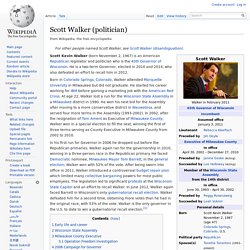
He started his career working for IBM before gaining a marketing job with the American Red Cross. At age 22, Walker lost a run for the Wisconsin State Assembly in a Milwaukee district in 1990. He won his next bid for the Assembly after moving to a more conservative district in Wauwatosa, and served four more terms in the Assembly (1993-2002). Sarah Palin. Sarah Louise Palin ( She was elected to Wasilla City Council in 1992 and became mayor of Wasilla in 1996.
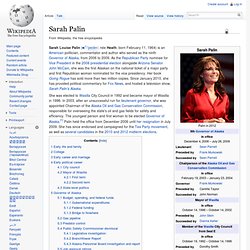
In 2003, after an unsuccessful run for lieutenant governor, she was appointed Chairman of the Alaska Oil and Gas Conservation Commission, responsible for overseeing the state's oil and gas fields for safety and efficiency. Condoleezza Rice. Following her confirmation as Secretary of State, Rice pioneered the policy of Transformational Diplomacy directed toward expanding the number of responsible democratic governments in the world and especially in the Greater Middle East.
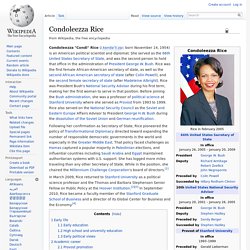
That policy faced challenges as Hamas captured a popular majority in Palestinian elections, and influential countries including Saudi Arabia and Egypt maintained authoritarian systems with U.S. support. She has logged more miles traveling than any other Secretary of State. While in the position, she chaired the Millennium Challenge Corporation's board of directors.[1] In March 2009, Rice returned to Stanford University as a political science professor and the Thomas and Barbara Stephenson Senior Fellow on Public Policy at the Hoover Institution.[2][3] In September 2010, Rice became a faculty member of the Stanford Graduate School of Business and a director of its Global Center for Business and the Economy.[4]
George W. Bush. 43rd President of the United States George Walker Bush (born July 6, 1946) is an American politician and businessman who served as the 43rd president of the United States from 2001 to 2009.
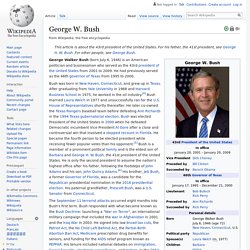
He had previously served as the 46th governor of Texas from 1995 to 2000. Nationally, Bush was both one of the most popular and unpopular U.S. presidents in history, having received the highest recorded presidential approval ratings in the wake of the 9/11 attacks, as well as one of the lowest approval ratings during the 2008 financial crisis.[13] Bush finished his term in office in 2009 and returned to Texas, where he had purchased a home in Dallas. In 2010, he published his memoir, Decision Points.[14] His presidential library was opened in 2013. His presidency has been ranked among the worst in historians' polls that were published in the late 2000s and 2010s. Jeb Bush. Bush grew up in Houston, Texas.
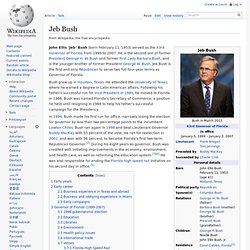
He attended the University of Texas, where he earned a degree in Latin American affairs. Following his father's successful run for Vice President in 1980, he moved to Florida. John Kerry. Barack Obama. Barack Hussein Obama II ( i/bəˈrɑːk huːˈseɪn oʊˈbɑːmə/; born August 4, 1961) is the 44th and current President of the United States, and the first African American to hold the office.
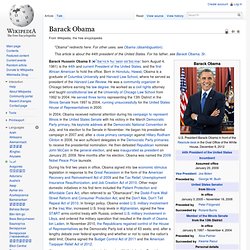
Born in Honolulu, Hawaii, Obama is a graduate of Columbia University and Harvard Law School, where he served as president of the Harvard Law Review. He was a community organizer in Chicago before earning his law degree. He worked as a civil rights attorney and taught constitutional law at the University of Chicago Law School from 1992 to 2004. He served three terms representing the 13th District in the Illinois Senate from 1997 to 2004, running unsuccessfully for the United States House of Representatives in 2000. Joe Biden. Hillary Rodham Clinton. BILAN BIKINI BODY GUIDE WEEK 2. Rhode Island. Rhode Island ( i/ˌroʊd ˈaɪlɨnd/ or /rɵˈdaɪlɨnd/), officially the State of Rhode Island and Providence Plantations,[6] is a state in the New England region of the United States.
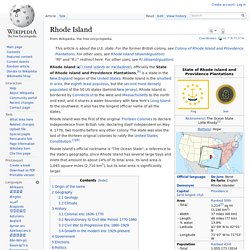
Rhode Island is the smallest in area, the eighth least populous, but the second most densely populated of the 50 US states (behind New Jersey). Rhode Island is bordered by Connecticut to the west and Massachusetts to the north and east, and it shares a water boundary with New York's Long Island to the southwest. Ouest américain. Impérialisme américain. Saadani.pdf. New Frontier. [W]e stand today on the edge of a New Frontier -— the frontier of 1960s, the frontier of unknown opportunities and perils, the frontier of unfilled hopes and unfilled threats. ...
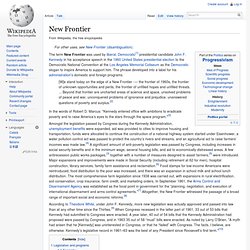
Beyond that frontier are uncharted areas of science and space, unsolved problems of peace and war, unconquered problems of ignorance and prejudice, unanswered questions of poverty and surplus.[2] In the words of Robert D. Marcus: "Kennedy entered office with ambitions to eradicate poverty and to raise America’s eyes to the stars through the space program. Programme Apollo. Partial Nuclear Test Ban Treaty. 7 October 1963 President Kennedy signs the Limited Nuclear Test Ban Treaty in the Treaty Room at the White House.
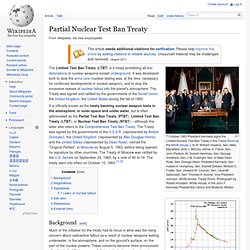
L-to-R: William Hopkins, Sen. Mike Mansfield, John J. McCloy, Adrian S. Fisher, Sen. Peace Corps. The Peace Corps is a volunteer program run by the United States government.
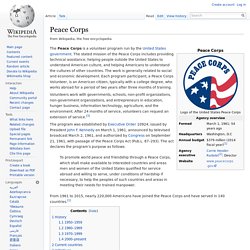
The stated mission of the Peace Corps includes providing technical assistance, helping people outside the United States to understand American culture, and helping Americans to understand the cultures of other countries. The work is generally related to social and economic development. Each program participant, a Peace Corps Volunteer, is an American citizen, typically with a college degree, who works abroad for a period of two years after three months of training.
Volunteers work with governments, schools, non-profit organizations, non-government organizations, and entrepreneurs in education, hunger business, information technology, agriculture, and the environment. North American fur trade. The North American fur trade was the industry and activities related to the acquisition, trade, exchange, and sale of animal furs in the North American continent. Aboriginal peoples in Canada and Native Americans in the United States of different regions traded among themselves in the Pre-Columbian Era, but Europeans participated in the trade beginning from the time of their arrival in the New World and extended its reach to Europe. The French started trading in the 16th century, the English established trading posts on Hudson Bay in present-day Canada in the 17th century, and the Dutch had trade by the same time in New Netherland. Trail of Tears.
Many Native Americans suffered from exposure, disease and starvation on the route to their destinations. Many died, including 2,000-6,000 of 16,542 relocated Cherokee.[2][3][4] European Americans, Jews, and African American freedmen and slaves also participated in the Chickasaw, Choctaw, Muscogee Creek and Seminole forced relocations.[5] In 1831, the Cherokee, Chickasaw, Choctaw, Muscogee Creek, and Seminole (sometimes collectively referred to as the Five Civilized Tribes) were living as autonomous nations in what would be called the American Deep South. Sitting Bull. Sitting Bull (Lakota: Tȟatȟáŋka Íyotake in Standard Lakota Orthography,[2] also nicknamed Slon-he or "Slow"; c. 1831 – December 15, 1890) was a Hunkpapa Lakota holy man who led his people as a tribal chief during years of resistance to United States government policies. He was killed by Indian agency police on the Standing Rock Indian Reservation during an attempt to arrest him, at a time when authorities feared that he would join the Ghost Dance movement.[3] §Early life[edit] Sitting Bull was born in Dakota Territory.[4][5] In 2007, Sitting Bull's great-grandson asserted from family oral tradition that Sitting Bull was born along the Yellowstone River, south of present-day Miles City, Montana.[6] He was named Jumping Badger at birth.[7] When Jumping Badger was fourteen years old he accompanied a group of Lakota warriors (which included his father and his uncle Four Horns) in a raiding party to take horses from a camp of Crow warriors.
§Red Cloud's War[edit] §Surrender[edit] Indian reservation. The collective geographical area of all reservations is 55,700,000 acres (22,500,000 ha; 87,000 sq mi; 225,000 km2), representing 2.3% of the area of the United States 2,379,400,204 acres (962,909,100 ha; 3,717,812.819 sq mi; 9,629,091.00 km2). Twelve Indian reservations are larger than the state of Rhode Island which covers 776,960 acres (314,420 ha; 1,214.00 sq mi; 3,144.2 km2) and nine reservations larger than Delaware's 1,316,480 acres (532,760 ha; 2,057.00 sq mi; 5,327.6 km2).
The territory of the Navajo Nation compares in size to West Virginia. Frontier Thesis. The Frontier Thesis or Turner Thesis, is the argument advanced by historian Frederick Jackson Turner in 1893 that American democracy was formed by the American Frontier. He stressed the process—the moving frontier line—and the impact it had on pioneers going through the process. He also stressed results, especially that American democracy was the primary result, along with egalitarianism, a lack of interest in high culture, and violence. Western United States. Yellowstone National Park. Transcontinental railroad. Native Americans in the United States. California Gold Rush. Manifest destiny. American frontier. NASA. Chronologie de l'exploration spatiale. Histoire : Benjamin Franklin, l’homme qui valait 100$ Histoire : First Lady of the United States. Les femmes dans l’histoire des Etats-Unis. Conception du monde des Amérindiens et liens avec l'organisation de la société.
Social Studies - American History through videos. La Loi sur les Indiens pour les nuls. Le site de l'Histoire. Voyages historiques et culturels. JFK. US States: Facts, Map and State symbols. United States History (1492-1898) for Kids « Printables. American Revolution for Kids « La crise financière et économique de 1929. John Fitzgerald Kennedy (1917-1963) Abraham Lincoln (1809-1865) Geronimo (1829-1909), Chef Apache. Rosa Park. Sitting Bull (1831-1890), Chef Sioux Hunkpapas Lakota. Biographie de Franklin Delano Roosevelt. États-Unis: Histoire- La colonisation européenne. Brève histoire de l’immigration aux États-Unis. Histoire. Maccarthysme . La Chasse aux Sorcieres aux Etats-Unis. Silicon Valley: les secrets d'une r?ussite.
John ROSS (1790-1866), Chef Cherokee du nord de la Géorgie. Le site de l'Histoire. Le pony express. Biographie - Malcolm X (Malcolm Little) History Learning Site. Al Capone. 19 juin 1953 : éxécution des époux Rosenberg. Espions 2/4. ELIOT NESS : L’incorruptible qui fit tomber Al Capone. Al Capone. Les États-Unis dans la guerre. Histoire Universelle : toute l'histoire du monde. Mitt Romney Biography - Facts, Life Story, Video, 2012 Election News.